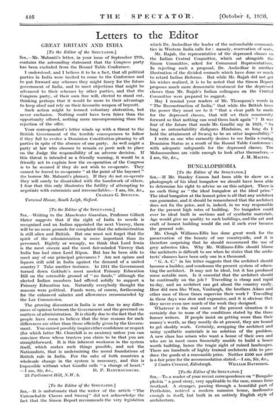Letters to the Editor
GREAT BRITAIN AND INDIA
[To the Editor of the SrEcrATon]
Sra,—Mr. Mahanti's letter, in your issue of September 27th, contains the astounding statement that the Congress party has been excluded from the Round Table Conference.
I understood, and I believe it to be a fact, that all political parties in India were invited to come to the Conference and to put forward any schemes they might fancy for the future government of India, and to meet objections that might be advanced to their schemes by other parties, and that the Congress party, of their own free will, elected to stand out, thinking perhaps that it would be more to their advantage to keep aloof and rely on their favourite weapon of boycott.
Such action might be termed voluntary abstention, but never exclusion. Nothing could have been fairer than the opportunity offered, nothing more uncompromising than the rejection of the offer.
Your correspondent's letter winds up with a threat to the British Government of the terrible consequences to follow if they fail to evolve a Dominion Constitution pleasing to all parties in spite of the absence of one party. As well might a party at law who chooses to remain ex pane seek to place on the Judge the responsibility of an adverse decision. If this threat is intended as a friendly warning, it would be a friendly act to explain how the co-operation of the Congress is to be secured if they do not wish to co-operate. They cannot be forced to co-operate "at the point of the bayonet" (to borrow Mr. Mahanti's phrase). If they do not co-operate they will surely be dissatisfied with the handiwork of others. I fear that this only illustrates the futility of attempting to negotiate with extremists and irreconcilables.—I am, Sir, &c.,
CHARLES G. SPENCER.
Tancood House, South Leigh, Oxford.




















































 Previous page
Previous page